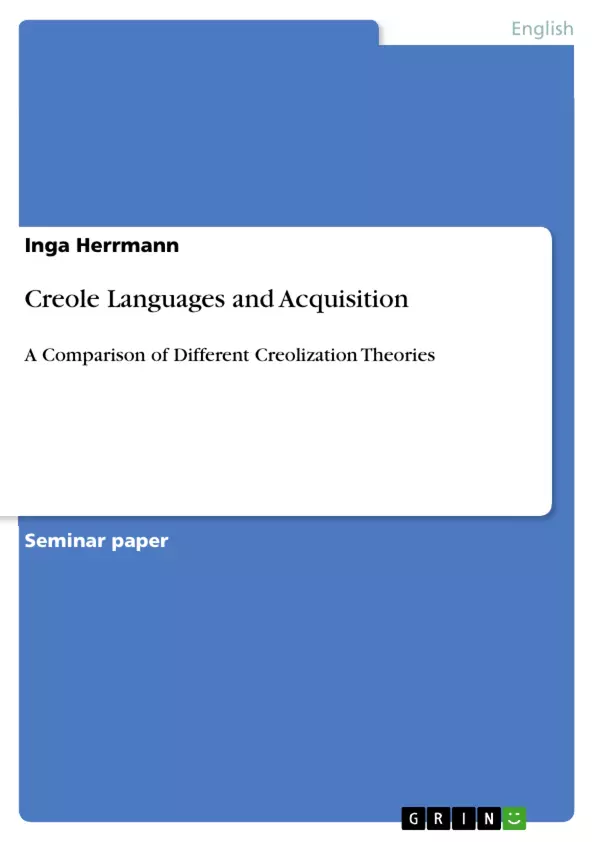1. Introduction
It could be as easy as that: pidgins equal second language acquisition (L2A) and creoles equal first language acquisition (L1A). But does this simple equation work out in reality? In the views of some researchers of contact languages and of language acquisition it clearly does. Others have a sceptical attitude towards this hypothesis and suggest different solutions in terms of creolization and acquisition. Creole genesis is a field of linguistic research that has been intensely debated on over the past few decades. Until today, no theory was commonly agreed upon and there are still many diverging explanatory approaches.
In my paper, I aim to throw light on this maze of different creole genesis theories. I will use a comparative approach in order to work out the similarities and differences of the researchers’ views. Often they agree in their overall assumption and only disagree in regard to smaller aspects. In other cases, their opinions are completely controversial and not able to bring in line with each other. In my account, I will also hint at the weak spots of the hypotheses and the criticism they are confronted with.
Table of Contents
- Introduction
- Different Views on Creolization and Acquisition
- The Bioprogram Hypothesis
- The Theory
- Criticism of the Bioprogram Hypothesis
- The Relexification Hypothesis
- The Theory
- Case Study: Nominal Structures in Haitian Creole
- Criticism of the Relexification Hypothesis
- The Gradualization Hypothesis
- The Theory
- Evidence in Regard to E-creolization
- The Bioprogram Hypothesis
- Conclusion
Objectives and Key Themes
This paper aims to provide an overview of the different theories of creole genesis, highlighting their similarities and differences. It will analyze the main arguments of each theory and examine the criticism they face.- The role of first and second language acquisition in creolization
- The Bioprogram Hypothesis and its critique
- The Relexification Hypothesis and its application to Haitian Creole
- The Gradualization Hypothesis and its focus on E-creolization
- The influence of Universal Grammar on creole languages
Chapter Summaries
Introduction
The introduction outlines the different perspectives on creolization and language acquisition, highlighting the debate surrounding creole genesis. It establishes the paper's aim to compare different theories and analyze their strengths and weaknesses.Different Views on Creolization and Acquisition
This chapter introduces three prominent theories on creolization and acquisition: the Bioprogram Hypothesis, the Relexification Hypothesis, and the Gradualization Hypothesis. It provides summaries of each theory, including their main arguments and their positions within the current debate.The Bioprogram Hypothesis
This section delves into Derek Bickerton's Bioprogram Hypothesis, which argues that creole languages are the result of first language acquisition by children exposed to impoverished pidgin input. It presents Bickerton's central ideas and the evidence supporting his hypothesis.The Relexification Hypothesis
This section explores the Relexification Hypothesis, which sees creolization as a process of second language acquisition driven by adults. It outlines the key tenets of this theory and examines a case study on nominal structures in Haitian Creole.The Gradualization Hypothesis
This section introduces the Gradualization Hypothesis, which proposes that creolization is a gradual process influenced by the interaction between pidgins and substratum languages. It examines the theory's core concepts and discusses evidence related to E-creolization.Keywords
The main keywords and focus topics of the paper are creolization, language acquisition, pidgin, creole, Bioprogram Hypothesis, Relexification Hypothesis, Gradualization Hypothesis, Universal Grammar, E-creolization. These keywords encapsulate the core concepts of the paper and highlight its focus on the development and evolution of creole languages.- Arbeit zitieren
- Inga Herrmann (Autor:in), 2008, Creole Languages and Acquisition, München, GRIN Verlag, https://www.grin.com/document/135211




